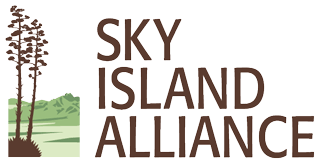Sky Island Alliance is committed to fostering a culture that embraces diversity and representation in all the work that we do. Our programs, employment, volunteer opportunities, and participation in all of our activities are open to all.
We value diversity in terms of experience, skills, abilities, and vocation, age, ethnic background and race, gender expression and sexual orientation, and in all other ways that having diverse voices enables us to better represent and serve our communities. We do not permit any discrimination against applicants, employees, or volunteers on the basis of race, creed, color, religion, national origin, ancestry, gender, age, sexual orientation, citizenship, disability, ethnicity, marital status, familial status, gender identity, economic circumstances, and/or veteran status.
We commit to working to reflect this diversity in our board, staff, and in our membership, and will continue to work to secure appropriate balance in representation in the teamwork, engagement, and collaboration that is essential to success in our programs.
Land Acknowledgement
The Sky Island Alliance office in Tucson is on the land of Tohono O’odham, Pascua Yaqui and other Indigenous peoples. Our work throughout the Sky Island region on both sides of the U.S.-Mexico border takes place on Indigenous land.
At Sky Island Alliance, we acknowledge the lack of truth and reconciliation with Native nations. Our organization is committed to continuing to educate ourselves about this process and mobilizing to stand in solidarity with present-day tribes and support Indigenous people who are acting to restore their rights and to protect the land we all call home.
We are currently educating ourselves on the Indigenous people to whom the land belongs, the history of the land, and Indigenous place names and language to better collaborate and support our neighboring Native nations and Indigenous peoples. We invite you to learn more about the Indigenous peoples of the Sky Island region using some of the resources below.
Communities With Ties to the Coronado National Forest
Sky Island Alliance works closely with the Coronado National Forest, where there are 12 federally recognized Native American tribes with a potential interest in natural, historical, cultural, and other resources of the forest. These tribes include the Ak-Chin Indian Community, Fort Sill Chiricahua-Warm Springs Apache Tribe, Gila River Indian Community, Hopi Tribe, Mescalero Apache Tribe, Pascua Yaqui Tribe, Salt River Pima-Maricopa Indian Community, San Carlos Apache Tribe, Tohono O’odham Nation, White Mountain Apache Tribe, Yavapai-Apache Nation, and the Pueblo of Zuni.
Native Lands Map
Take a moment to explore the Native Lands map developed by the Canadian, Indigenous-led nonprofit Native Land Digital. The project strives to “go beyond old ways of talking about Indigenous people and to develop a platform where Indigenous communities can represent themselves and their histories on their own terms [and] create spaces where non-Indigenous people can be invited and challenged to learn more about the lands they inhabit, the history of those lands, and how to actively be part of a better future going forward together.”
Neighboring Tribal Government
Learn more about the Tohono O’odham Nation and Pascua Yaqui Tribe at their official websites. And get more information about other tribes in Arizona.
Solidarity With Indigenous Peoples
Land acknowledgment is only one small part of supporting Indigenous communities. Solidarity takes many forms and can look like:
- Donating time and money to Indigenous-led organizations.
- Amplifying the voices of Indigenous people leading grassroots-change movements.
- Making space for the next generation of Native leaders in Arizona, like the youth-led Indigenous People’s Initiative, which is advocating to officially abolish Columbus Day in favor of Indigenous Peoples’ Day.
- Returning land.
Recommended Reading
One clear start to what will become a lifelong path of growth and understanding is to reimagine your list of “environmental classics” to include the voices of Black, Indigenous, and people of color (BIPOC). There are some great resources available to guide your reading.

